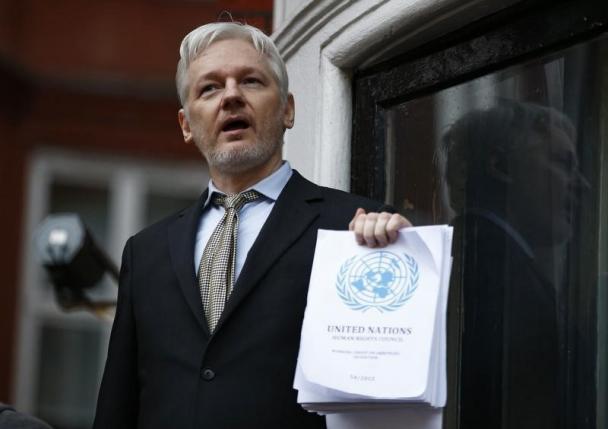
WikiLeaks founder Julian Assange holds a copy of a U.N. ruling as he makes a speech from the balcony of the Ecuadorian Embassy, in central London, Britain February 5, 2016. REUTERS/Peter Nicholls
Lawyers for Julian Assange have made a formal request to a Swedish court to overturn an arrest warrant for the Wikileaks founder in a rape case.
The move follows a decision by a United Nations panel that his stay in the Ecuadorian embassy in London amounted to “arbitrary detention”.
Assange filed a complaint in 2014 with the UN committee – arguing that he was arbitrarily detained because he was incapable of leaving the embassy without being arrested.
The journalist, 44, took refuge at the embassy in June 2012 after his appeal against extradition to Sweden failed in the UK courts.
Thomas Olsson, one of Assange’s lawyers, said in a statement: “We consider that there have arisen a number of new circumstances which mean there is reason to review the earlier decision”.
Assange is wanted for questioning in Sweden over a sex allegation, which he denies, but believes that if he goes to Sweden he will be taken to the United States for questioning over the activities of WikiLeaks.
He says the accusation is a scheme that would eventually lead to his extradition to the United States, where a criminal investigation into the activities of WikiLeaks is still open.
The UN Working Group on Arbitrary Detention said earlier this month that Assange should be allowed to leave the embassy in London.
Authorities in Britain and Sweden rejected the UN panel’s finding, saying Assange had detained himself by seeking refuge in the embassy.
A second lawyer representing Assange said he remained ready to be interrogated in the Ecuadoran embassy, according to Sweden’s national news agency.
Ecuador has granted Assange asylum, yet he is unable to travel to the South American country. Assange says his rights have been infringed.
Both Britain and Sweden denied that Assange was being deprived of freedom. An application to interview Assange will be renewd, said the Swedish prosecutor in charge of the case.
Prosecutor Marianne Ny said the U.N. panels’ non-binding ruling had no impact on the case.
In 2010, WikiLeaks released more than 90,000 secret documents on the U.S.-led military campaign in Afghanistan, followed by almost 400,000 U.S. military reports detailing operations in Iraq. Those disclosures were followed by release of millions of diplomatic cables dating back to 1973.
A U.S. Grand Jury investigation into WikiLeaks is ongoing.
